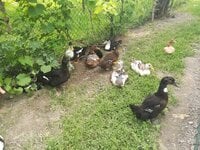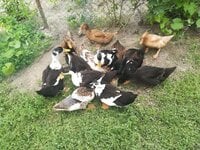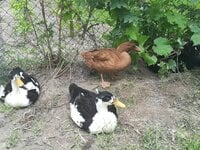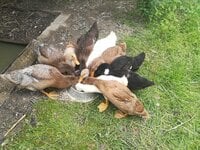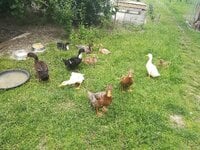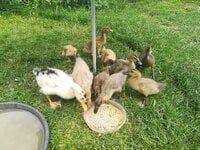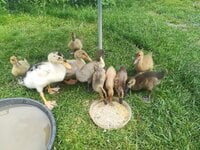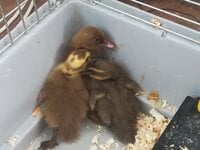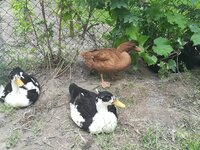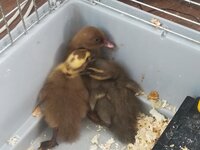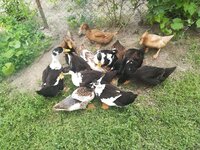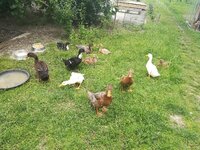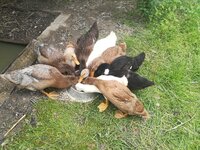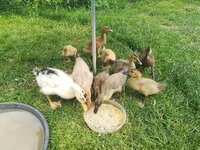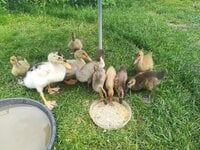Eric Rosario
Chirping
- Aug 5, 2019
- 90
- 76
- 81
hello,
I would like to share some of my results from mixing ducks for colours.
group 1:
2x pekin ducks
2x rouen ducks
2x drake "hungarian peasant duck" identified closely as Ancona
1x white Ancona duck
1x colorful drake called same as "hungarian peasant duck" but firstly I've identified the breed as Silver applyeard later it is closer to welsh harlequin, it looks it's something between. not sure with their genetics. so I'm calling the breed as silver/harlequin for now.

group 2:
1x black duck - pekin x rouen,
2x ducks "hungarian peasant duck" sibblings of the colourful drake in group 1 silver harlequin
1x orpington duck
2x orpington drakes
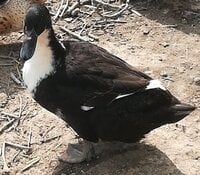
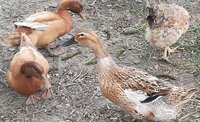
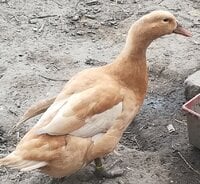
our ducklings so far:
ducklings 1: mostly black from black duck but two ducklings are same silver/harlequin I guess they are from the parents in group 1 however the genes should be recessive and the drake and ducks were separated, maybe there were some fertilized eggs before they were separated.
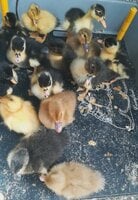
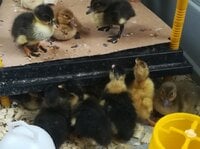
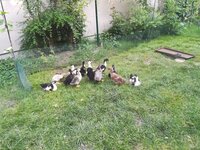
ducklings 2: two rouen blue so i was happy that my orpington drakes are orpington standard containing one blue gene, as there is lighter version with two blue genes or darke without blue gene. our first orpington duckling hatched from slightly green egg as I've seen that the orpington female lays these greenish eggs.
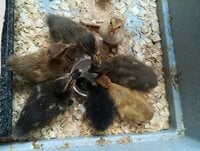
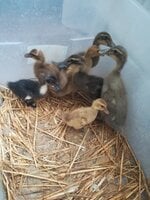
ducklings 3: were added to the ducklings 2: for some reason suddenly 3 white ducklings appeared.
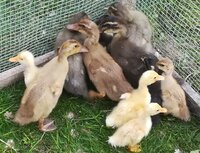
ducklings 4: one ancona white with black spots, and second one is brown, merged with ducklings from group 5
ducklings 5: contains several different colours, one is black+blue, some others are dark yellow, or lighter mallard, I'm a bit surprised, and i have no idea about the genese of these, will need to see them as adults.
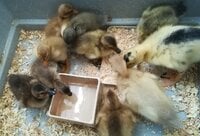
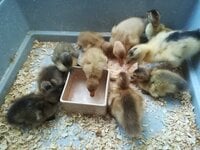
ducklings 6: another suprise, 2 "chocolates" hatched one with yellow brown head.
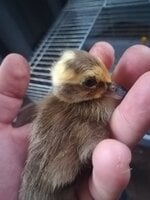
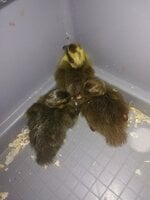
more are to come, we have still eggs in incubator, and for now there are only eggs from Silver/harlequin females + orpginton drakes.
based on offspring i should be able to identify closely the genes of parents, however i've messed up the eggs in first ducklings. We don't have the group 1 of parents anymore. Group 2 parents are still active, however the black duck is broody so she is not laying anymore and only eggs are those I need the most from silver+orp.
I would like to share some of my results from mixing ducks for colours.
group 1:
2x pekin ducks
2x rouen ducks
2x drake "hungarian peasant duck" identified closely as Ancona
1x white Ancona duck
1x colorful drake called same as "hungarian peasant duck" but firstly I've identified the breed as Silver applyeard later it is closer to welsh harlequin, it looks it's something between. not sure with their genetics. so I'm calling the breed as silver/harlequin for now.

group 2:
1x black duck - pekin x rouen,
2x ducks "hungarian peasant duck" sibblings of the colourful drake in group 1 silver harlequin
1x orpington duck
2x orpington drakes



our ducklings so far:
ducklings 1: mostly black from black duck but two ducklings are same silver/harlequin I guess they are from the parents in group 1 however the genes should be recessive and the drake and ducks were separated, maybe there were some fertilized eggs before they were separated.



ducklings 2: two rouen blue so i was happy that my orpington drakes are orpington standard containing one blue gene, as there is lighter version with two blue genes or darke without blue gene. our first orpington duckling hatched from slightly green egg as I've seen that the orpington female lays these greenish eggs.


ducklings 3: were added to the ducklings 2: for some reason suddenly 3 white ducklings appeared.

ducklings 4: one ancona white with black spots, and second one is brown, merged with ducklings from group 5
ducklings 5: contains several different colours, one is black+blue, some others are dark yellow, or lighter mallard, I'm a bit surprised, and i have no idea about the genese of these, will need to see them as adults.


ducklings 6: another suprise, 2 "chocolates" hatched one with yellow brown head.


more are to come, we have still eggs in incubator, and for now there are only eggs from Silver/harlequin females + orpginton drakes.
based on offspring i should be able to identify closely the genes of parents, however i've messed up the eggs in first ducklings. We don't have the group 1 of parents anymore. Group 2 parents are still active, however the black duck is broody so she is not laying anymore and only eggs are those I need the most from silver+orp.




